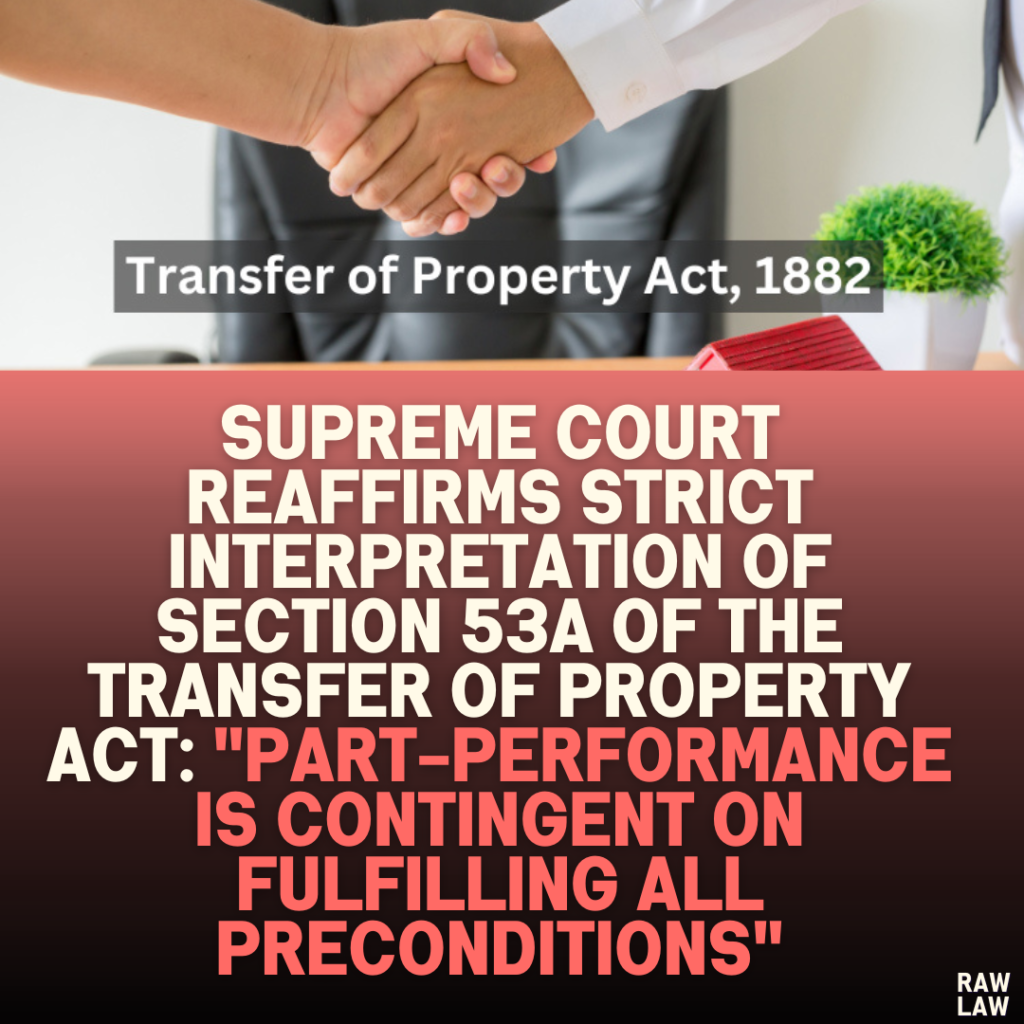Court’s Decision
The Supreme Court dismissed the Special Leave Petition challenging the Karnataka High Court’s decision, which upheld the judgments of the Trial Court and First Appellate Court. The court ruled that the petitioner failed to demonstrate compliance with the conditions required to invoke the protection under Section 53A of the Transfer of Property Act, 1882. The court emphasized that the doctrine of part-performance must be strictly construed.
Facts
- The case originated from a suit filed by the original plaintiffs in 1988, seeking declaration of title and recovery of possession of the disputed property.
- The Trial Court decreed the suit in favor of the plaintiffs, holding them to be lawful owners and granting possession of the property.
- The petitioners (original defendants) claimed protection under a sale agreement dated November 25, 1968, which allegedly allowed them to take possession of 2 guntas of land for a total consideration of Rs. 850.
- The First Appellate Court affirmed the Trial Court’s decision. Subsequently, the High Court also dismissed the Second Appeal filed by the petitioners.
- The High Court framed the following substantial question of law:
- Whether the courts below erred in decreeing the suit for possession despite the defendants’ claim of protection under Section 53A of the Transfer of Property Act, as interpreted in relevant precedents?
Issues
- Whether the petitioners could invoke protection under Section 53A of the Transfer of Property Act without a valid, enforceable, and registered sale agreement.
- Whether the findings of the lower courts regarding possession were erroneous or perverse.
- Whether the High Court was justified in dismissing the appeal on legal and factual grounds.
Petitioner’s Arguments
- The petitioners argued that the plaintiffs had executed a sale agreement in 1968 for transferring 2 guntas of land, allowing the petitioners to take possession of the property.
- They contended that this agreement conferred rights under Section 53A, which bars the transferor from evicting the transferee if possession was taken in part performance of the contract.
- They relied on the doctrine of part-performance, asserting that they had fulfilled their obligations under the contract.
Respondent’s Arguments
- The respondents denied the existence of any such sale agreement.
- They argued that the property was under their ownership until 1983-84, when the petitioners illegally occupied a shed constructed by the plaintiffs.
- They further pointed out that the petitioners’ claim for occupancy rights before the Land Tribunal had already been dismissed and had attained finality.
Analysis of the Law
The Supreme Court analyzed Section 53A of the Transfer of Property Act, which provides protection to a transferee in possession of property under an unregistered contract for sale, provided the following conditions are met:
- Existence of a valid written contract: The contract must be in writing, signed by the transferor, and clearly outline the terms of transfer.
- Part-performance by the transferee: The transferee must take possession (or continue possession) of the property in furtherance of the contract.
- Fulfillment or willingness to fulfill obligations: The transferee must perform or show readiness to perform their obligations under the contract.
The court emphasized that Section 53A is an exception to the general rules of transfer and registration and must be strictly construed. A party invoking this provision must unequivocally satisfy all the statutory preconditions.
Precedent Analysis
The petitioners cited the Supreme Court’s decision in Shrimant Shamrao Suryavanshi v. Pralhad Bhairoba Suryavanshi (2002), which elaborates on the doctrine of part-performance. However, the court distinguished the present case on factual grounds, noting that:
- The petitioners failed to produce a valid and enforceable sale agreement.
- The alleged contract was unregistered and lacked legal credibility.
- The factual circumstances in the cited case were different, rendering the precedent inapplicable.
Court’s Reasoning
- On Possession: The court found that the petitioners failed to establish lawful possession of the property under a valid sale agreement. The High Court, relying on the findings of the lower courts, noted that the shed on the property was constructed by the plaintiffs and later occupied illegally by the petitioners.
- On Applicability of Section 53A: The petitioners did not satisfy the statutory conditions of part-performance. Specifically:
- No valid written contract existed.
- The petitioners did not prove performance of obligations under the alleged agreement.
- Consistency of Lower Courts’ Findings: The court observed that the Trial Court and First Appellate Court’s conclusions were based on documentary and oral evidence, with no perversity or error of law.
Conclusion
The Supreme Court dismissed the Special Leave Petition, holding that the petitioners failed to prove their case under Section 53A of the Transfer of Property Act. The doctrine of part-performance could not be invoked without strict compliance with statutory requirements. Pending applications were also disposed of.
Implications
- The judgment reinforces the principle that Section 53A is not a blanket protection for transferees and can only be invoked under stringent conditions.
- It highlights the necessity of a valid and enforceable written agreement to claim possession rights.
- This decision serves as a caution for parties relying on informal or unregistered agreements, emphasizing the need for compliance with legal formalities.



